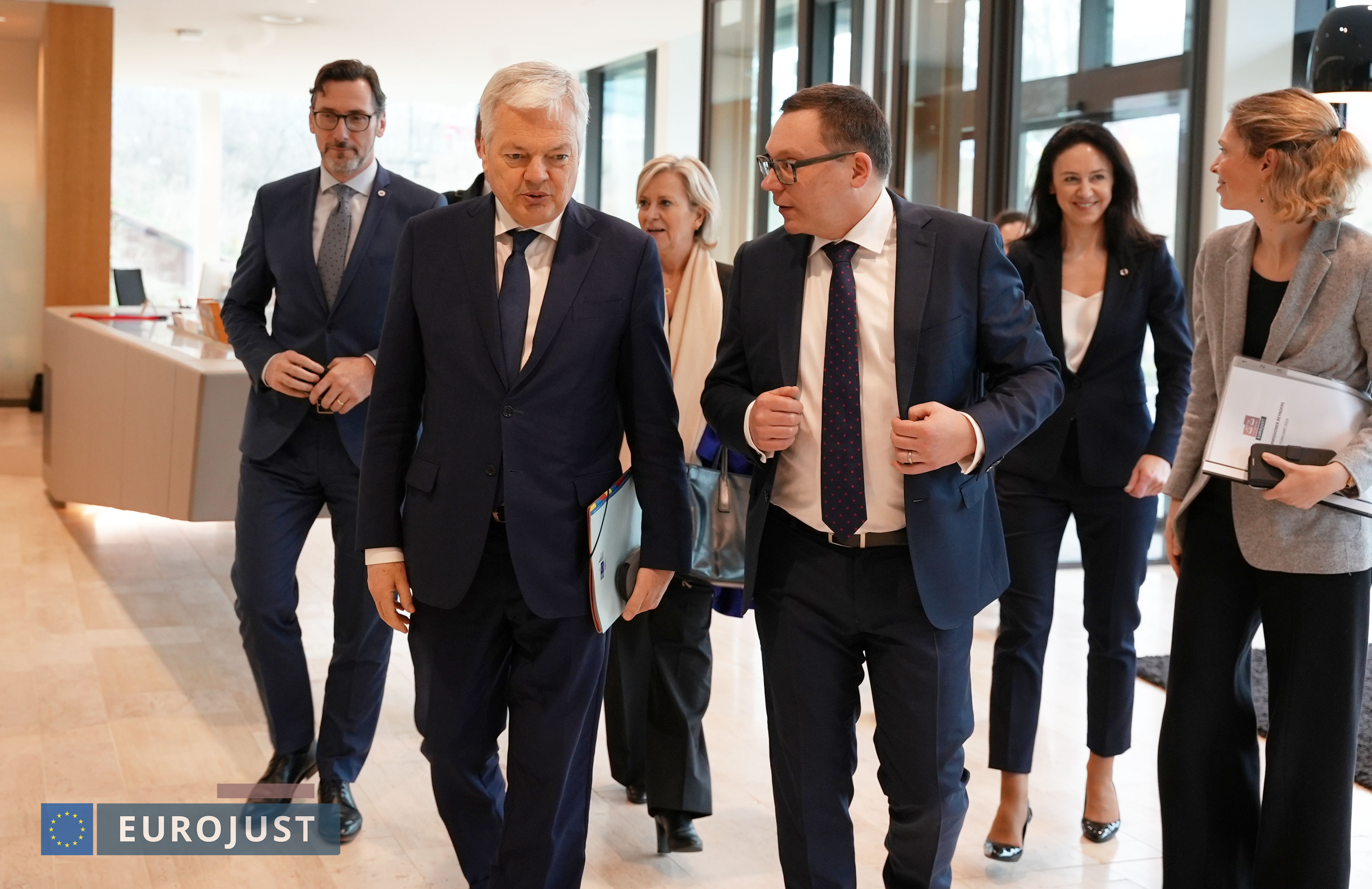European Commissioner for Justice Mr Didier Reynders today visited Eurojust to take stock of the Agency’s major achievements since taking up his duties in 2019. Both in the last year of their mandate, Commissioner Reynders and Eurojust President Ladislav Hamran jointly reflected on key developments, including the Digital Criminal Justice project, Commission-funded external cooperation projects such as EuroMed Justice and the WB Crim Just project and the latest milestones in the fight against impunity for core international crimes committed in Ukraine. The visit also provided an excellent opportunity for a forward-looking discussion about the future of Eurojust.

While at Eurojust, Commissioner Reynders had the opportunity to visit the International Centre for the Prosecution of the Crime of Aggression against Ukraine (ICPA). The European Commission played an essential role in setting up the ICPA, which started its work in July 2023.
European Commissioner for Justice Mr Didier Reynders said: ‘Eurojust has played a key role in supporting judicial cooperation for many years. During my time as Justice Commissioner, I have relentlessly advocated and worked towards further reinforcing Eurojust’s mandate and tools to accomplish its mission. In 2021, the Commission proposed a number of legislative measures with the objective of modernising judicial cooperation, including cooperation with Eurojust. The war in Ukraine has also led Eurojust to play a central role in facilitating investigations into core international crimes. I am grateful to President Hamran for his outstanding leadership and to Eurojust’s staff for their professionalism and commitment to ensuring efficient judicial cooperation within the EU and beyond.’
Eurojust President Mr Ladislav Hamran noted: ‘I am grateful for the invaluable support Eurojust has received from the Commissioner since the start of his mandate. By working side by side, we have made major progress in creating a modern digital infrastructure and gateways to jurisdictions across the globe for prosecutors and judges in the Member States. Our work has been overshadowed by the atrocities of the war in Ukraine, but I am proud of our important contribution to the fight against impunity.’
Digital Criminal Justice
In 2020, the European Commission proposed to create an EU-wide digital platform that would enable Eurojust and judicial authorities in the Member States to exchange critical information on criminal investigations rapidly and efficiently. As part of these efforts, Eurojust was asked to roll out a state-of-the-art digital infrastructure for the European judiciary.
This digital infrastructure has several components, including a collaboration platform for joint investigation teams, further enhancements of the Judicial Counter-Terrorism Register, and a comprehensive modernisation of Eurojust’s Case Management System as a platform for data exchange and the identification of links between ongoing investigations and prosecutions. Commissioner Reynders was given an overview of the current state of play and future actions.
Cooperation projects
During Commissioner Reynders' mandate , Eurojust had the opportunity to explore new avenues of cooperation with several stakeholders within the European Commission. One of the Agency’s priorities is to strengthen existing judicial cooperation with third countries in key regions.
For this reason, Eurojust hosts and implements the EuroMed Justice Programme, which focuses on the countries in the Southern Neighbourhood and is funded by the Neighbourhood, Development and International Cooperation Instrument – Global Europe (NDICI – Global Europe), as well as the WB Crim Just project, which focuses on the Western Balkans and is funded by the European Union Instrument of Pre-accession Assistance (IPA III).
A third major project is SIRIUS, which is the central reference point in the EU for knowledge sharing on cross-border access to electronic evidence, co-implemented by Eurojust and Europol and also funded through the NDICI – Global Europe instrument.
Ukraine
Since February 2022, Commissioner Reynders and Eurojust have worked closely together to ensure an effective judicial response to Russia’s war of aggression against Ukraine. Within one month of the start of the war, Eurojust assisted in setting up a joint investigation team into alleged core international crimes committed in Ukraine.
In February 2023, Eurojust launched the Core International Crimes Evidence Database (CICED), following an amendment of the Eurojust Regulation that was adopted in record time thanks to the active support of Commissioner Reynders. CICED is a tailor-made judicial database to preserve, store and analyse evidence of core international crimes, i.e. war crimes, crimes against humanity and genocide.
Commissioner Reynders also paved the way for the establishment of the International Centre for the Prosecution of the Crime of Aggression against Ukraine (ICPA) at Eurojust, ensuring that Eurojust would receive the necessary political and financial support to implement this new cooperation platform.
